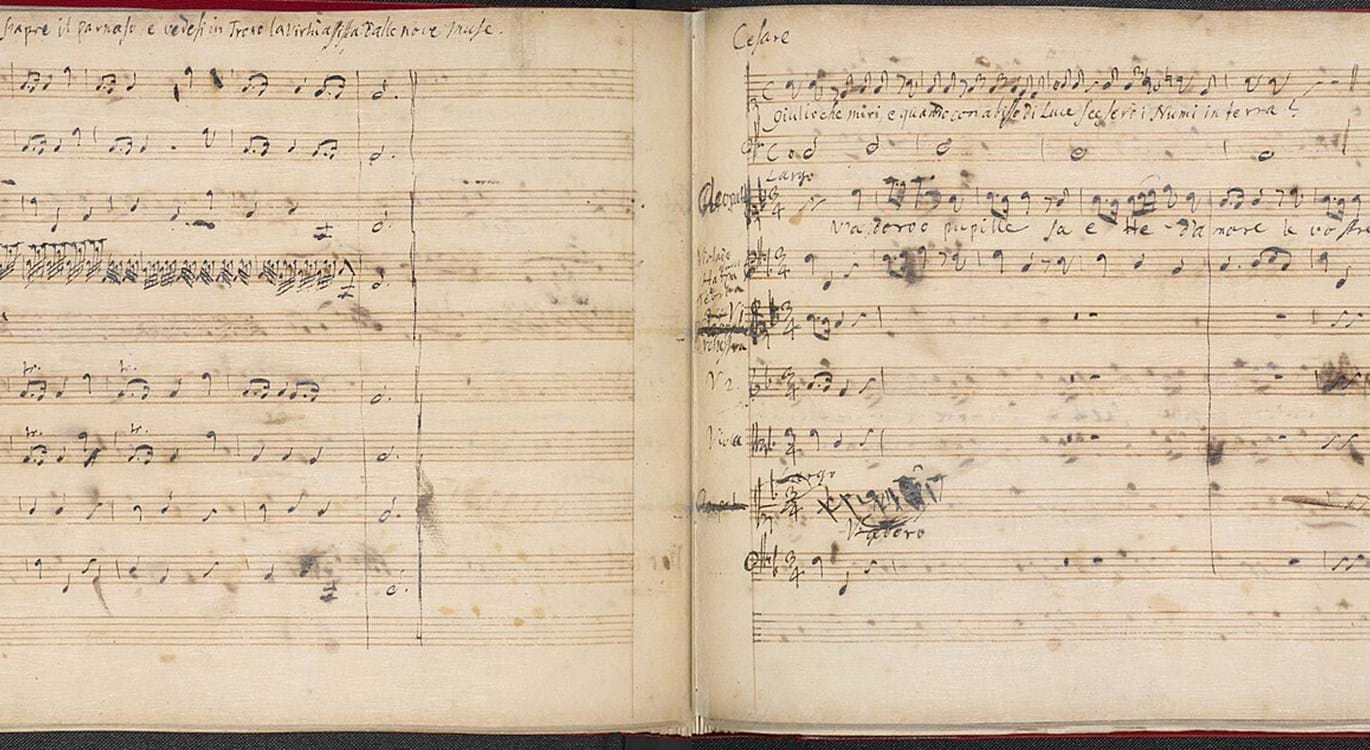Did the task of composing orchestral masterpieces take such a toll on Bach and Handel that they suddenly forgot how to spell their names!? No, of course not. The initials S.D.G. stand for the Latin phrase Soli Deo Gloria, to the glory of God alone. These men understood how music could be used to praise God, aid worship, and, ultimately, attribute glory to God for His work in creation, and redemption.
However, more than being a simple, yet effective, dedication of a piece of music to God, Soli Deo Gloria was one of the rallying cries of the Protestant Reformation, and is a central doctrine of the Christian faith.
On the surface though, it may appear that this particular sola is estranged from the other Reformation slogans: grace alone, faith alone, Christ alone, and Scripture alone. These four biblical doctrines can be housed in two camps; answering two questions which are at the heart of the contention between the Protestant Reformers, and the Roman Catholic Church: How can I be saved from sin and therefore have peace with God? & Where can I find the answer to such a question?
From that point of view, it would seem that Soli Deo Gloria belongs in a different conversation. However, far from being “at a loose-end”, to the glory of God alone is the sola that ties all the others together.
This Reformation tenet has particular reference to salvation. Since the salvation of men and women from sin, and from the righteous condemnation of a holy God, is by grace alone through faith alone in Christ alone without any meritorious contribution on the part of the individual, all glory for such salvation is given to God, and God alone.
Concerning this, Scripture has much to say:
“For by grace you have been saved through faith; and that not of yourselves, it is the gift of God; not as a result of works, so that no one may boast” (Ephesians 2:8,9 NASB 1995).
“Salvation belongs to the LORD. Your blessing is upon Your people. Selah” (Psalm 3:8).
“I am the LORD: that is my name: and my glory will I not give to another, neither my praise to graven images” (Isaiah 42:8 KJV).
One question that we may well ask before going further is: what is glory? Dictionaries will offer various definitions depending on the context:
Glory is the fame and admiration that you gain by doing something impressive
A person’s glories are the occasions when they have done something people greatly admire which makes them famous
The glory of something is its great beauty or impressive nature[1]
Biblically speaking, the “glory of God” can be a difficult thing to describe to one’s total satisfaction since it’s so multi-faceted. Interestingly, in the Hebrew language of the Old Testament, the root verb for the word “glory” means weight, or heaviness. Looking deeper at the Old Testament part of the Bible, we see that a “talent” was a unit of measurement for weighing gold, silver and so on (Exodus 38:24; 2 Samuel 12:30). The more talents an object weighed, the more value it had (e.g., five talents of gold are worth more than one talent of gold). Even today in some instances, the value of a thing is often determined, at least in part, by its weight – diamonds for example. And so, “glory” is linked to worth, or value.
Additionally, in the New Testament part of the Bible, written in the Greek language, “glory” refers to splendour; brightness; majesty; or an exalted state. Speaking of the Lord Jesus Christ, the Apostle John says:
“And the Word became flesh and dwelt among us, and we beheld His glory, the glory as of the only begotten of the Father, full of grace and truth” (John 1:14).
Therefore, when we speak of “glory”, and the “glory of God” in particular, we’re thinking of all these things: worth, value, majesty, exaltation, splendour, honour, dignity, and perfection.
It’s perhaps important to note at this juncture that we cannot “make” God more glorious than He already is. God cannot “grow” in any of His attributes. One Scripture says:
“Be ye therefore perfect, even as your Father which is in heaven is perfect” (Matthew 5:48 KJV).
To improve on what is perfect would imply that the thing was not perfect in the first place. However, while we cannot “add” glory to God (since He is inherently glorious), we can ascribe glory to God. Another Scripture says:
“Ascribe to the LORD, O families of the peoples, ascribe to the LORD glory and strength! Ascribe to the LORD the glory due his name; bring an offering and come before him! Worship the LORD in the splendour of holiness” (1 Chronicles 16:28,29 ESV).
Essentially, Soli Deo Gloria is reminding us of that passage and others like it. The first four solas provide the answers to man’s deepest need, the fifth puts them all into their proper perspective: that there is no room for the glory of man in salvation. We have already quoted Psalm 3:8 and Ephesians 2:8,9 - passages that emphasize the work of God in bringing new life to spiritually dead sinners (John 3:3; Ephesians 2:1). Since “salvation belongs to the LORD” (Psalm 3:8), all glory for such a great salvation is ascribed to Him and Him alone.
How does such “giving” or “ascribing” of glory manifest itself in the life of a believer? Among other things, by offering our lives as living sacrifices (Romans 12:1); by acknowledging His greatness in worship (for one does not worship that which is considered inferior); and by giving thanks to the LORD for His goodness. The Apostle Paul, in 1 Corinthians 10:31, teaches: “Whether, then, you eat or drink or whatever you do, do all to the glory of God” (NASB 1995).
It’s possible that, in light of our duty to give glory to God, a critic might respond:
Is God’s desire that His name be glorified, and even His demand to be worshipped, nothing short of egotism?
The Bible does not shy away from the fact that God does what He does for His own glory (Exodus 14:4; Ephesians 1:6,12,14), and so it sounds like a reasonable question, with the exception that it does not take into consideration the worthiness of God. Since God is the great Creator and Sustainer (Genesis 1:1), He has the right to everything and nothing is outside His ownership. Moreover, since He is perfect in all His ways (Deuteronomy 32:4), He has the right to be worshipped and glorified and is perfectly justified in His demands.
One may be tempted to think that whether glory is given to God or not is an abstract doctrinal issue that has no real bearing on our lives. However, such an assessment couldn’t be further from the truth. The Apostle Paul, again, in the opening chapter of his letter to the Roman believers, indicts the human race with sin against God:
“For although they knew God, they neither glorified him as God nor gave thanks to him, but their thinking became futile and their foolish hearts were darkened. Although they claimed to be wise, they became fools and exchanged the glory of the immortal God for images made to look like a mortal human being and birds and animals and reptiles” (Romans 1:21-23 NIV).
God’s glory was, and still is, in the firing-line when people sin, whether they realise it or not. Instead of being thankful, and glorifying God as we ought, we are naturally inclined, because of our sinful nature, to give glory to anything and everything that isn’t God. The only way that this can be rightly recalibrated in our lives is through faith in Jesus Christ.
When a person is, to use the language of the Lord Himself, “born again” (John 3:3), that person inherits a new nature; a work that is effected by the power of the Holy Spirit indwells a person at the point of believing (John 14:17; Romans 8:9; Titus 3:5). In this new life, the glory of God is the motivation for everything that the believer does: our worship should evidence reverence; we ought to have high standards for how we treat others since they are also divine image-bearers; and, ultimately, we should seek to preach His gospel so that others may also believe the great message of salvation in Christ alone (Romans 10:14,15).
In the final analysis, Soli Deo Gloria is not mere doctrinal semantics. It is the tie that binds all the solas together; the focal point of our worship, the purpose of our very existence, and the core of the gospel. As the first question and answer of the Westminster Shorter Catechism states:
What is the chief end of man? Man’s chief end is to glorify God, and to enjoy Him forever.
To God be the glory, great things He hath done; so loved He the world that He gave us His Son;
Who yielded His life an atonement for sin, and opened the life-gate that all may go in.
Praise the Lord! Praise the Lord! Let the earth hear His voice; Praise the Lord! Praise the Lord! Let the people rejoice;`
O, come to the Father, through Jesus the Son, and give Him the glory; great things He hath done.
[1] https://www.collinsdictionary.com/dictionary/english/glory



